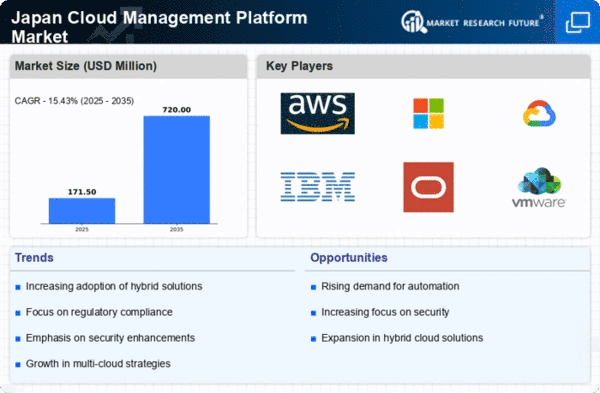Rising Demand for Cost Efficiency
The The market in Japan is experiencing a notable surge in demand for cost efficiency. is experiencing a notable surge in demand for cost efficiency. Organizations are increasingly seeking solutions that enable them to optimize their cloud expenditures. According to recent data, Japanese enterprises are projected to allocate approximately 30% of their IT budgets towards cloud services by 2026. This shift is driven by the need to reduce operational costs while maintaining high service levels. As businesses strive to enhance their financial performance, cloud management platforms that offer transparent pricing models and cost management tools are becoming essential. The ability to monitor and control cloud spending effectively is likely to be a key differentiator in the competitive landscape of the cloud management-platform market. Consequently, vendors that can provide robust financial analytics and budgeting capabilities may find themselves at a significant advantage.
Growing Emphasis on Data Sovereignty
In Japan, the cloud management-platform market is increasingly influenced by the emphasis on data sovereignty. With stringent regulations governing data privacy and protection, organizations are compelled to ensure that their data remains within national borders. This regulatory landscape is prompting businesses to adopt cloud management solutions that facilitate compliance with local laws. As a result, the demand for platforms that offer localized data storage and processing capabilities is on the rise. It is estimated that by 2025, around 40% of Japanese companies will prioritize cloud solutions that align with data sovereignty requirements. This trend indicates a shift towards platforms that not only provide technical capabilities but also address legal and regulatory concerns, thereby enhancing trust and security in cloud services.
Emergence of Edge Computing Solutions
The The market in Japan is witnessing a significant shift towards multi-cloud strategies. is being shaped by the emergence of edge computing solutions. As organizations increasingly seek to process data closer to the source, the integration of edge computing with cloud management platforms is becoming essential. This trend is particularly relevant in sectors such as manufacturing and IoT, where real-time data processing is critical. It is projected that by 2027, the edge computing market in Japan will reach approximately $5 billion, driving demand for cloud management solutions that can effectively manage edge resources. The ability to provide real-time analytics and support for distributed architectures is likely to be a key factor in the success of cloud management platforms. Consequently, vendors that can offer robust edge computing capabilities alongside traditional cloud management features may find themselves well-positioned in this evolving landscape.
Increased Focus on Multi-Cloud Strategies
The The market in Japan is increasingly influenced by the emphasis on data sovereignty. is witnessing a significant shift towards multi-cloud strategies. Organizations are increasingly adopting a multi-cloud approach to leverage the strengths of various cloud providers. This trend is driven by the desire for flexibility, redundancy, and the ability to avoid vendor lock-in. Recent surveys indicate that approximately 50% of Japanese enterprises are currently utilizing multiple cloud services, and this figure is expected to rise. As businesses seek to optimize their cloud environments, the demand for management platforms that can seamlessly integrate and orchestrate services across different cloud providers is likely to grow. This shift presents opportunities for vendors to develop solutions that enhance interoperability and provide comprehensive visibility across multi-cloud environments, thereby addressing the complexities associated with managing diverse cloud resources.
Advancements in Cloud Security Technologies
The The market in Japan is being shaped by the emergence of edge computing solutions. is increasingly influenced by advancements in cloud security technologies. As cyber threats continue to evolve, organizations are prioritizing security measures to protect their cloud environments. Recent studies suggest that nearly 70% of Japanese companies consider security as a top concern when adopting cloud solutions. This heightened focus on security is driving demand for cloud management platforms that incorporate advanced security features, such as automated threat detection and response capabilities. Furthermore, the integration of artificial intelligence and machine learning into security protocols is likely to enhance the effectiveness of these platforms. As businesses seek to safeguard their data and maintain compliance with regulatory standards, the cloud management-platform market is expected to see a rise in solutions that offer comprehensive security frameworks.
















